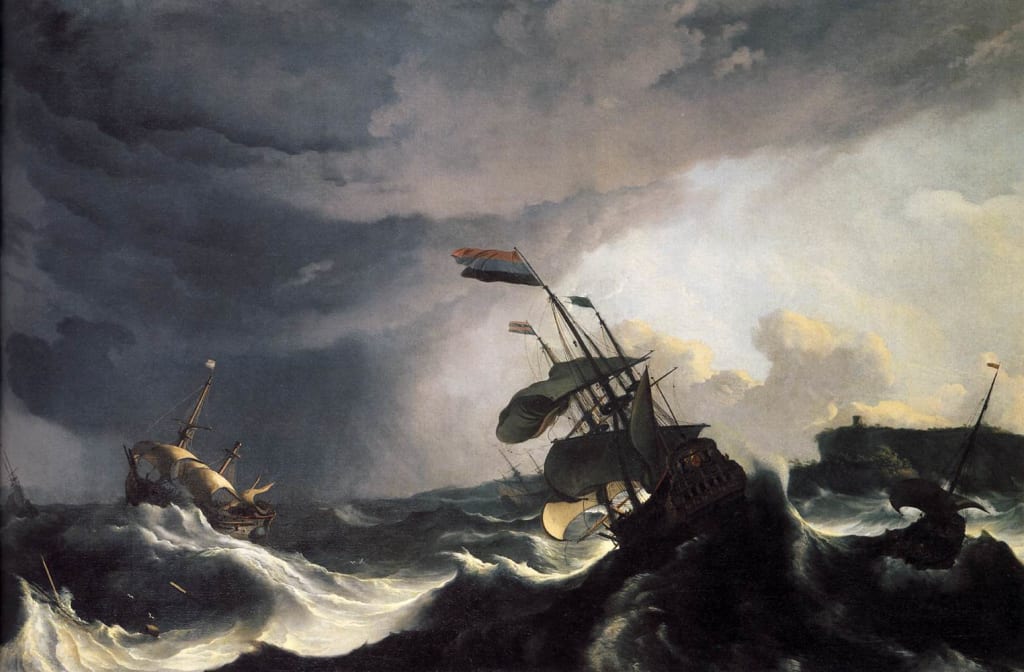Existence According to Robert Frost
A Forewarning and Cautionary Poem on How We Should Be Living on the Daily

Sometimes, as humans, we tend to go about our average, busy lives without realizing what might be lurking behind us in the shadows. Is it pain? Grief? Death? We are so caught up in the hustle of our "one track mind" lives that we forget to realize the consequences of our actions in doing so. We forget to look over our shoulders for dangers that are sneaking up behind. Our lack of alertness has caused big trouble for some of us, and sometimes we don't realize until it's too late.
This is why we have poets, right? For lots of artistic reasons, of course, but nonetheless to remind us of these troubling dangers in the most creative way possible. The late great Robert Frost is no exception.
In his poem "Once by the Pacific," all of this is put into perspective for us to understand, through his means of writing. Frost uses the elements of nature and elements of poetry to instill a sense of foreboding fear, and impending doom to his reader—through an "apocalyptic" wave that can destroy the earth. A warning to the reader that puts their mortal life into perspective. It's nothing short of a wake up call to those oblivious.
The set rhythm and form of the poem is very purposeful; as the poem progresses the harsher it gets. This symbolizes an oncoming storm growing on the horizon and quickly approaching. The repetition and rhyme scheme of the poem creates the sense of continuous, crashing waves against the shores surface. As the poem intensifies with its content, the reader can visualize the “waves” beginning to intensify as well. For example, the poem begins easy and simple, using soft sounding words such as “din” and “in” as well as “shore” and “before” to create a sense of a soft ocean shore and an easy tide. This lures the reader into a sense of false security, just as we normally go about our daily lives, not expecting anything rash to happen.
We then begin to feel the storm start to intensify as the use of diction intensifies. This is done through the use of tougher vowel sounding words such as “intent,” “continent,” “cliff,” and “if.” Finally, the raging storm approaches at the end of the poem with brash and absolutely harsh vowel sounds such as “age,” “rage,” “broken,” and “spoken.” The shift in the poem happens almost immediately in the middle, with that transition of diction all within a matter of a few lines. This directly applies to life. One moment we are going about our daily routine-—smooth sailing—business as usual. In the next moment, without notice, we're tossed recklessly into intense tribulations we did not expect coming!
The use of personification is used to further the implications that this ocean waves and storm have a mind of its own. When they come, they plan to show no mercy. This absolutely heightens the sense of fear into the reader. It's implied that the ocean, (a power of earth we humans take for granted) is plotting against humankind (the shore) through the phrase;
“...and thought of doing something to the shore the ocean never did before...”
And not just a quick misdeed at that or "a night," but “an age” of destruction. The apocalyptic nature of the storm is heightened through the idea that the entire world will be destroyed;
“The shore was backed by the cliff” and “the cliff was backed by the continent”—or in other words, the entire planet, all of which will be engulfed by the the overpowering water. When the fact is taken into account that the amount of water on earth completely surpasses the amount of land on earth... well it's frightening to assume the outcome if indeed the ocean were to turn on us with “dark intent.” All land dwelling creatures would stand no chance. Frost puts our human existence into an extremely mortal perspective with this. Something like the ocean, which the majority of us have come to love, trust, and enjoy—and associate with positive emotions—can turn on us and cause destruction in the blink of an eye.
At the very end of the poem, the speaker reinforces this idea with an illusion to The Bible:
"Before God’s last Put out Light was spoken”.
The reference here is to "God's" creation of the world. Just as he quickly gave “light” to the world, he can just as quickly diminish it. All with the drop of hat or a snap of the fingers. And the picture doesn't get any bigger than that. If the message isn't fully driven into the reader's head at that point... well, let's just hope they have a life vest handy.
We never fully realize or appreciate the true power of the ocean until it's right in our faces, which is just the point Frost is trying to get across. And what better way to do this than through the means of fear tactics? His use of the poetic devices and allusions helps the reader come to a better understanding about themselves, giving them insight on how we should be tackling our days.
Don't let the dark horses of life attack without knowing.
Be aware before the storm reaches your doorstep. Don't let it brew and thunder without notice. Always live with foresight and hindsight in mind, helping you make your decisions, and how exactly you're going to live your life. View life not only for what it is, but for what it could be and act accordingly. With the words of Frost in mind and his tale of warning, this will benefit you greatly because you never know who, or what, is planning to strike.
About the Creator
Trevor Lloyd
An exploration into human thought and conversation. Ideas that deserved to be shared. Curiously definitive topics, with odds and ends. Spark a discussion. You're just as curious as I am.






Comments
There are no comments for this story
Be the first to respond and start the conversation.